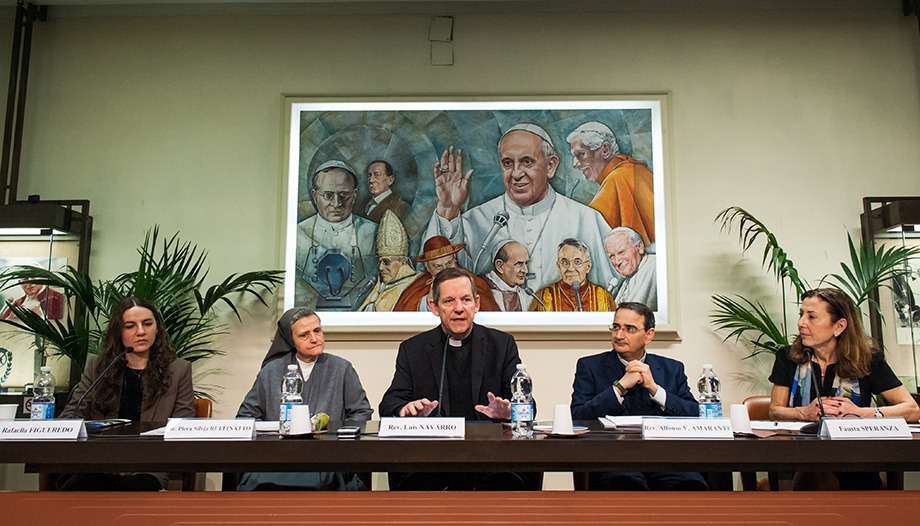The Sala Marconi (Palazzo Pio - Piazza Pia) hosted the press conference for the presentation of the Report 2022 of the Pontifical Universities and Institutions of Romein view of the Hearing that the Pope Francis will be given to their respective academic communities on Saturday, February 25, in the Paul VI Hall. Also present will be the Prefect of the Dicastery for Culture and EducationCardinal José Tolentino de Mendonça.
The Pontifical Roman Universities and Institutions - whose rectors are members of the Conference CRUIPRO - represent a catchment area of 16,000 students from five continents, 22 academic communities located in various districts of the Capital, 2,000 professors, 3,000 degrees awarded in the last academic year, 600 employees, 15 Congregations, Religious Orders and other Church institutions in charge of the task.
The Report, produced with the contribution of the communication contacts of the various Universities and Institutions, gathers the most important data of the Pontifical Universities, from their mission at the service of the universal Church to the number of students trained each year, with some comparisons with the civil universities of Rome.
The document also provides an opportunity to highlight the potential that the Network among the various academic communities represents for the evangelization of culture.
Presentation of the report
The press conference - moderated by Fausta Speranza, Vatican Media's foreign correspondent - was attended by: Luis Navarro (Pontifical University of the Holy Cross), president of the Conference of Rectors of Roman Pontifical Universities and Institutions (CRUIPRO); Sr. Piera Silvia Ruffinatto (Pontifical School of Education Auxilium), vice-president CRUIPRO; Alfonso V. Amarante (Pontifical Alfonsianum Institute), CRUIPRO secretary general; Rafaella Figueredo, CRUIPRO student representative.
Professor Luis Navarro outlined the horizon of the challenge: ever closer collaboration between the different academic communities, so that there is "unity in diversity, in a world that is increasingly showing the need for shared and convergent research between specialists from different disciplines".
The President of the Conference of Rectors recalled the task indicated by the Pope in Veritatis Gaudium to "elaborate intellectual instruments capable of proposing themselves as paradigms of action and thought, useful for proclamation in a world marked by ethical-religious pluralism". In this context, the Report is also born - stressed Navarro - as a further opportunity to enhance the potential that the network between the various academic communities represents for the evangelization of culture.
Piera Silvia Ruffinatti recalled some recent initiatives, such as academic mobility between universities, with the recognition of credits or free transfers. Father Alfonso V. Amarante specified the perimeter of the academic communities involved: seven universities, two colleges, nine institutes and the 8% of all university students in Rome. In this regard, Navarro mentioned the legal and regulatory framework to understand the difference between the task of dealing with the sacred sciences proper to ecclesiastical universities and the Catholic approach of some faculties.
Some data
If we then look at the institutions affiliated with Rome's activities, we find 221 universities or faculties: in a cultural connection that goes from Jerusalem to the Dominican Republic, from India to Oregon, from Romania to Brazil. The ratio of students to professors stands out, at 6 to 1, compared to the average of 16 to 1 recorded in the other universities of the capital, whether state-owned or not.
The richness of the cooperation between the communities can also be understood by remembering that they refer to no less than fifteen institutions of the Church entrusted to them, from the Prelature of the Holy Cross and the Opus Dei to the Order of the Discalced Carmelites, from the Congregation of the Most Holy Redeemer to the Society of the Missionaries of Africa, etc.
A richness that - Professor Amarante recalled - must always be thought of also in terms of "internal" relationship with the various realities linked to the mission of the Church, but also "external", projected towards the creation of what the Reverend called "essential fields of dialogue" with the state academic worlds.
Rafaella Figueredo expressed the point of view of the members, who highlighted the enthusiasm of the young people called to take charge of the animation in the Paul VI Hall, with the harmonious support of the students of the Pontifical Institute of Sacred Music, among others, before the Pope's greeting.
At the heart of all this is "the relaunching of ecclesiastical studies in the context of the new stage of the Church's mission," as stated in the proem of the Apostolic Constitution Veritatis Gaudium promulgated by Pope Francis on December 8, 2017 and made public on January 29, 2018.
"The building of knowledge," wrote Fausta Speranza in the pages of L'Osservatore Romano, "has always been the great gamble of humanity, between the diachronic accumulation of knowledge and the rupture of established certainties. If at one time we reasoned about the unfathomable ocean of Newton or the illusions of positivist linearity, today we must debate about data science and so-called artificial intelligence. The ethical challenge is essentially the same: to react to the tendency to regress human choice to the level of the use of knowledge, which today means technology. But - as Sister Piera emphasizes - "we must be able to know and meet the challenges of digitalization also thanks to the knowledge of ever new disciplines".
For this reason, despite the diversity of charisms and talents, despite the changes and variations of programs and approaches linked to the times, one presupposition indissolubly unites all the pontifical "laboratories of knowledge": not to give knowledge a disembodied character, but to redirect it to human needs.
For those who participate in a pontifical university - this is what has become clearly evident - at the beginning of their research is man and on the horizon of their objectives is the desire to understand the world in order to transform it, to make it a better place to live in.












